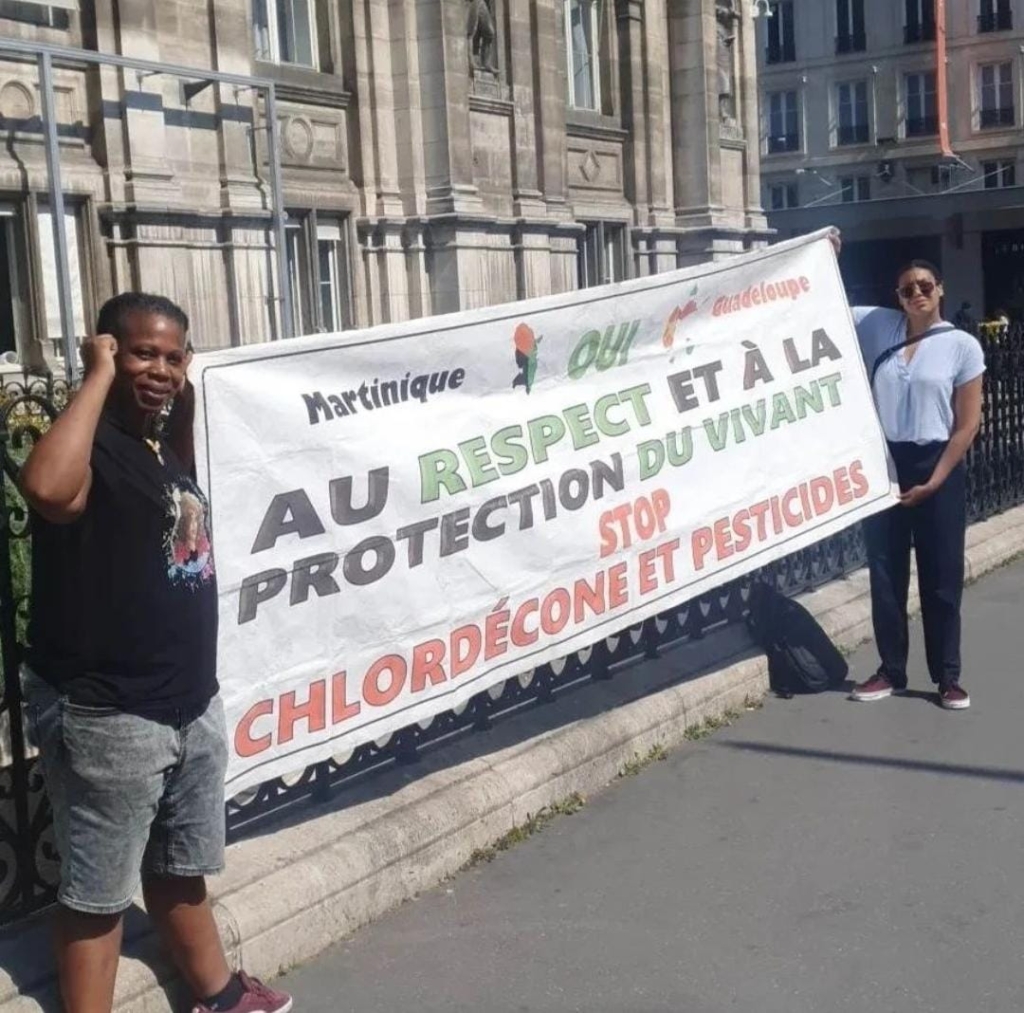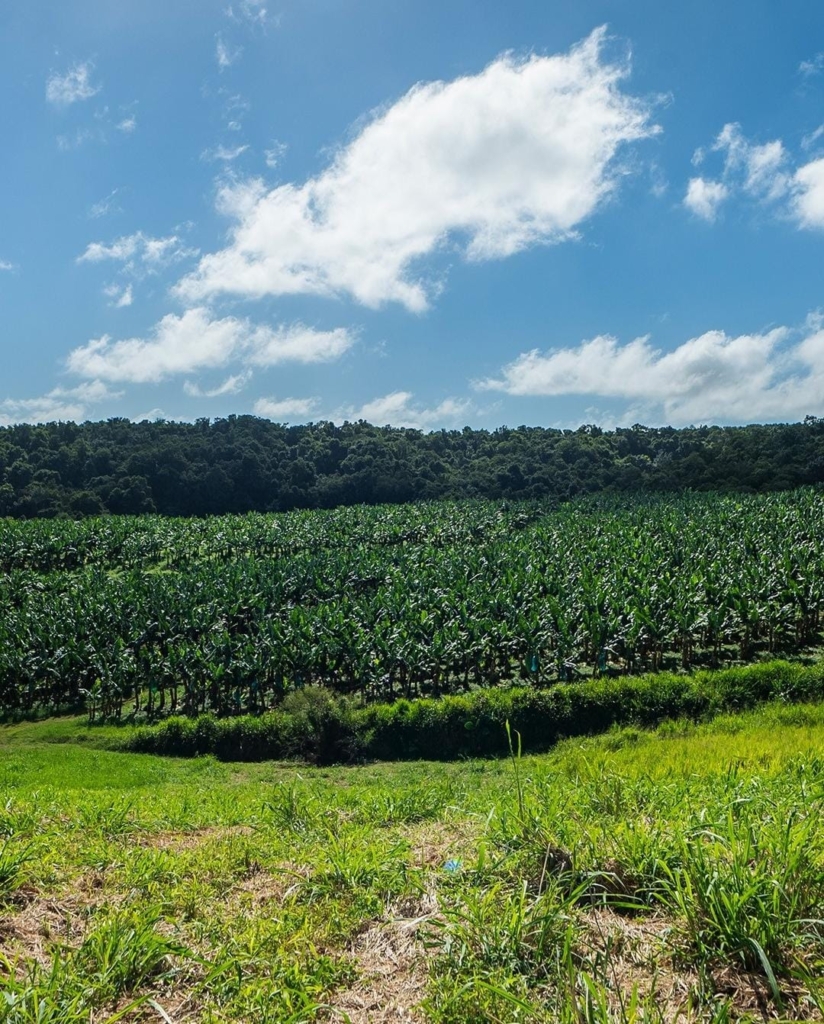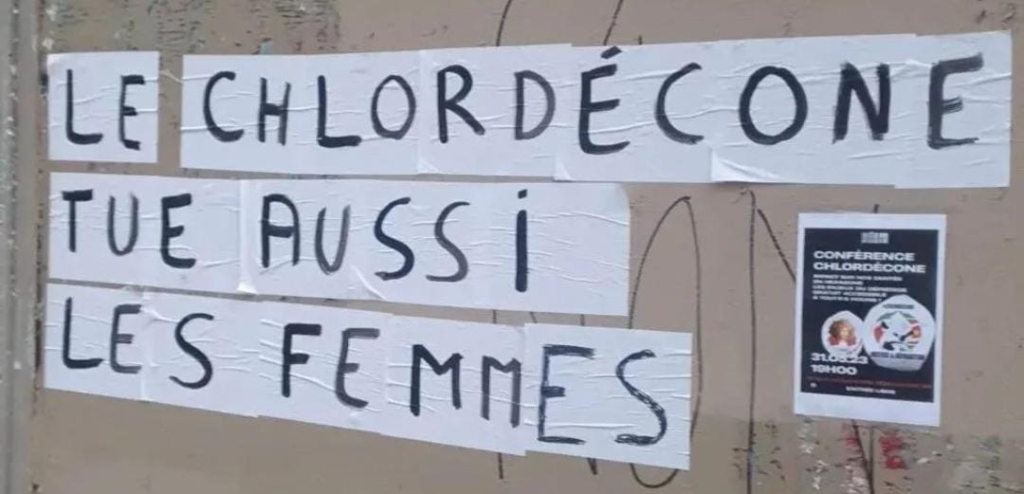Black lesbian eco-feminists fight for victims of Caribbean pesticide poisoning
Moïse Manoël-Florisse, is an African-Caribbean online journalist keeping an eye…
Activists win Paris vote granting free pesticide testing.

Over 90 percent of the population of Guadeloupe and Martinique is contaminated by a pesticide, chlordecone (Kepone), which was used on banana plantations from 1972 to 1993 with the acquiescence of French health authorities who were well aware of its toxicity for humans. Today, Guadeloupe and Martinique have the highest rates of prostate cancer in the world.
Chlordecone is neurotoxic, carcinogenic chemical that not only disrupts reproduction and development but also effects fertility for future generations.
In the face of this health scandal, an Afro-Caribbean LGBT+ association, Diivines.LGBTQIA+, helped win a unanimous vote from the Paris City Council on June 8 to provide free screening for chlordecone in Parisian health centers, with particular focus on the West Indian community, which is most affected. Previously, such blood tests cost between 120 and 160 euros [US $130 – $174].
In an interview, Pierrette Pyram Ambrosio, president of Diivines.LGBTQIA+, discusses the association’s fight for free chlordecone screening for West Indians in Paris:
Erasing 76 Crimes: Why are black lesbian activists against racism and lesbophobia in Paris or the suburbs interested in public health and the subject of chlordecone, which mainly affects the West Indies?

Pierrette: During demonstrations, we met the Parisian representative of a Martinican association supporting banana workers contaminated by chlordecone. This organization is called “0 chlordécone, objetif 0 poison”. It is still seeking redress for this health scandal, which I believe is also an environmental crime. Moreover, the end of aerial spraying of chlordecone was late.
At the end of 2022, with other personalities such as Malcom Ferdinand, we wanted to continue the fight in Paris against this “state poisoning” by pursuing our mission of informing the public, through a collective called “chlordécone justice et réparation” which occupied the pavement at Place de la Nation, where Mathilde Panot (a left-wing deputy from La France Insoumise) who is very familiar with the water issue in Guadeloupe, came to meet us to hear our grievances.
At the same time, we at the Diivines.LGBTQIA+ association have been reflecting on the impact of chlordecone on women’s health, while deploring the fact that we don’t have enough information on the subject. If the correlation between prostate prevalence and chlordecone exposure in the French West Indies is now accepted (although more detailed and comparative studies are still needed), there’s no reason to think that women aren’t also affected by the pesticide in terms of health.
That’s why my father asked me if I’d been tested the last time I was in Guadeloupe, but since I live in France all year round, I told him it was out of the question to pay 130 euros for a test in Paris, and that we had to fight for free screening for all West Indians living in [Paris] who may have been exposed to chlordecone at different stages of their lives in the West Indies. Chlordecone does not discriminate on the basis of sexual orientation.
Erasing 76 Crimes: How were you able to translate your aspirations into a political proposal put to the vote?
Pierrette: We organized a conference on May 31, dedicated to the public health issue of free chlordecone screening, for West Indians living in the Paris region as well as in France.

To this end, Alice Coffin and Laurent Sorel (a native of Martinique), who are Paris councillors, undertook to translate our aspirations into a vow that we co-wrote together, before submitting it to a vote by Parisian elected representatives on June 8. The wish was unanimously accepted.
It was very moving, because it’s also the culmination of struggles that have been waged by grassroots activists for several years in the French West Indies. And at the same time, it’s an action that benefits all Afro-Caribbean people living here in Paris.
After June 8, all the capital’s health centers received a letter from Anne Souyris, the city’s public health deputy, to keep them informed. …
We’d like things to move faster, and we’ve already put together a list of 10 volunteers to be screened. We hope that this will be taken as seriously as the monkeypox epidemic in 2022, for example.
We are also calling for a national campaign to raise awareness of the impact of chlordecone on our state of health, with the help of a manual or booklet aimed at all people originally from the West Indies or who have lived there for a time, including tourists who have stayed there several times.
Finally, more doctors need to be trained in the chlordecone issue, especially at the Institut Gustave Roussy in Villejuif, which specializes in oncology, because more and more cancer patients coming directly from Guadeloupe and Martinique are going there alone, due to the lack of adequate hospital care in the two islands. This is a very serious situation.
Erasing 76 Crimes: Have those responsible for this health scandal been brought to justice, and what is life like for West Indians there today?

Pierrette: The courts haven’t gone our way. On January 2, they dismissed the case, even though they recognized that environmental damage had been caused. We’re going to appeal against the government and the banana growers’ lobby. In the future, we hope that public institutions will no longer give money to people who were responsible for this health scandal.
Otherwise, on a daily basis, the people of the West Indies have to deal with the consequences of an environmental crime, since the air, soil and water, as well as plants and animals, were contaminated during the aerial spraying of chlordecone.
Consumption of local produce is not recommended, but this depends on the location, as chlordecone concentrations are not the same everywhere. Livestock farming and coastal fishing are affected, while groundwater is also affected, due to stocks of pesticides that were carelessly left on the ground and spilled into streams during cyclones.
In this context, it is imperative to decontaminate the soil, if at all feasible, which represents several hundred square kilometers.
But we can’t give up. Guadeloupeans have no choice but to live in their own archipelago.




Qtalk plea: My lover started dating my best friend. What can I do?